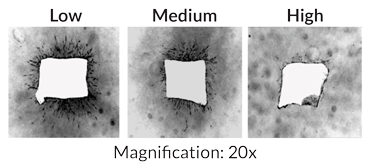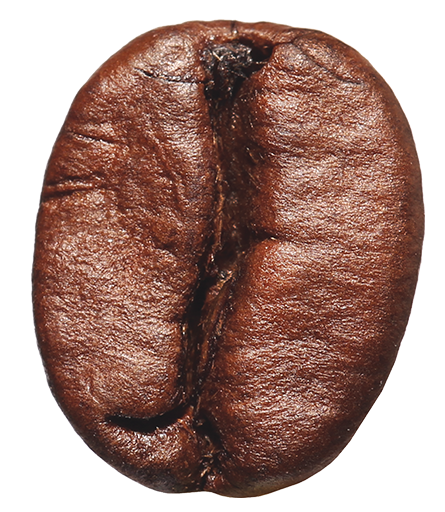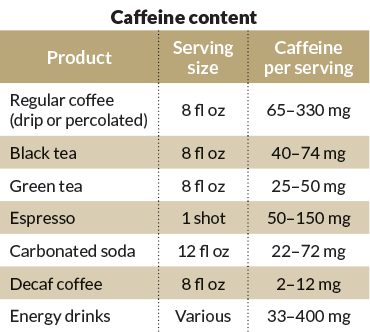Coffee reveals itself as an unlikely elixir
From liver disease to diabetes, coffee compounds protect against an array of health conditions

COOL BEANS Despite its checkered past and addictive nature, coffee has proven itself to be a positive player in human health.
Nutnarin Khetwong/istockphoto
For a historically mistrusted drink, coffee is proving to be a healthy addiction. Scientific findings in support of coffee’s nutritional attributes have been arriving at a steady drip since the 1980s, when Norwegian researchers reported that coffee seemed to fend off liver disease. Since then, the dark brown beverage has shown value against liver cancer, too, as well as type 2 diabetes, heart disease and stroke. Coffee even appears to protect against depression, Parkinson’s and Alzheimer’s diseases.
Taken as a whole, these results might explain the most astonishing finding of all. People who drink two or more cups of coffee a day live longer than those who don’t, after accounting for behavioral differences, U.S. researchers reported in 2012. Studies in Japan, Scotland and Finland agree.
Talk about a twofer. Coffee not only picks you up, it might put off the day they lower you down.
Yet coffee has had trouble shaking its bad-for-you reputation. It may be one of the most widely consumed drinks in the world, but people have long assumed that, at least in its energizing caffeinated version, coffee comes with a catch.
“People notice the caffeine,” says cardiologist Arthur Klatsky, who has researched coffee for decades at the Kaiser Permanente Northern California Division of Research in Oakland. “And there is this general feeling that anything that has some effect on the nervous system has to have something bad about it.” It doesn’t help that caffeine is mildly addictive.
Coffee doubters nodded when studies in the 1970s suggested that coffee bore heart risks. There had also been rumors it could stunt growth or cause cancer. True, coffee has downsides for some people, but those concerns aren’t among them.
Pregnant women should go easy on the high-test, since excess caffeine has been linked to miscarriage risk. And caffeinated coffee can disturb sleep or make a person jittery. Caffeine can increase heart rate, but its links to chronic high blood pressure are now in doubt.
“Coffee consumption has not been consistently linked with hypertension,” says Rob van Dam, a Dutch nutritional epidemiologist at the National University of Singapore. In fact, most worries once attached to coffee and caffeine, including stomach ulcers, acid reflux and the heart flutter known as atrial fibrillation, fail to show up in large population studies.
Most studies show benefit — or at least no harm — from coffee. As a result, the aggregate view on the popular beverage is changing. But acceptance is slow in coming because scientists have yet to fully ascertain just how coffee works. Among its ingredients, caffeine and polyphenols are clearly positive players, but beyond that, coffee gets muddy.
“It’s extremely difficult to impossible to tease out the effects of the individual components of coffee because there are so many of them,” says Frank Hu, a Harvard nutritional epidemiologist. “And they travel together.”
To the liver rescue
Coffee’s most obvious benefits go to the liver, a big, busy organ. Nutrients get absorbed from food through the gastrointestinal tract and enter the blood. Those nutrients are metabolized in the liver — detox central — which regulates blood levels of fats and sugars.
Chronic liver disease affects up to 15 percent of the U.S. population. The liver is most often damaged by drinking excess alcohol, contracting hepatitis C virus or developing fatty liver disease, which is associated with obesity. Just as the skin forms patches of tough collagen protein over damaged areas, the liver does, too. Over time, this process can result in fibrous collagen scars, or fibrosis, which can disrupt blood flow through the liver. The risk is cirrhosis and, ultimately, liver failure, says Jonathan Dranoff, a gastroenterologist and hepatologist at the University of Arkansas for Medical Sciences in Little Rock.
That’s where coffee comes in. When the liver senses tissue damage, the compound adenosine binds to receptor proteins on the liver’s stellate cells. These make collagen to form fibrous scars. Caffeine binds to the adenosine receptors and interrupts the signaling process so that collagen isn’t mass-produced.
Caffeine tamps down collagen overproduction in a second way. It hits the enzyme alanine aminotransferase, which is implicated in fibrosis. People with liver disease who drink caffeinated coffee make less of the enzyme than minimal drinkers.
In a large U.S. study last year, people drinking two or more cups of decaf daily also suppressed the troublesome enzyme. Other studies suggest that certain polyphenols in coffee — found in decaf or regular — knock down that enzyme.
Coffee drinkers who have hepatitis C, a viral infection that can lead to liver fibrosis and cancer, show similar benefits. Of 177 liver disease patients, most with hepatitis C, those who drank more than two cups of caffeinated coffee per day were less likely than scant drinkers to have their fibrosis become severe, according to a study in Hepatology in 2010. Curiously, other sources of caffeine, such as energy drinks, didn’t provide a benefit.
Fatty liver disease, which is rising in tandem with obesity rates, may be susceptible to coffee as well. U.S. scientists identified 306 overweight people who hadn’t been diagnosed with liver disease. Ultrasound images and biopsies revealed 180 who had fat deposits in the liver, early signs of fibrosis. Based on those tests, coffee abstainers were moving faster toward fibrosis than consumers. People who had advanced-stage fatty liver averaged less than a cup a day of caffeinated coffee, compared with nearly two cups for those who were still at an early stage of the disease, a 2012 report in Hepatology noted.
Coffee shows a stunning effect against liver cancer. Earlier this year, a European team reported that women who drank two and a half or more cups and men who drank three and a half or more daily were 72 percent less likely to develop liver cancer than people who drank less than about one-third cup a day. The study included roughly half a million healthy people monitored for 11 years. During the study, 201 people developed liver cancer. The findings remained robust even when adjusted to account for hepatitis, the scientists reported in the April 15 International Journal of Cancer.
The liver cancer finding “is likely to be an extension of a possible protective effect of coffee on chronic liver disease,” says study coauthor Anna Flögel of the German Institute of Human Nutrition Potsdam-Rehbrücke in Nuthetal.
Some doctors are convinced. “Do I prescribe coffee to my patients?” Dranoff asks. “For those with chronic liver disease, the answer is yes.” In a 2014 review in Liver International, UCLA physician Sammy Saab and his colleagues stated that “daily coffee consumption should be encouraged” for patients with liver disease.
The diabetes defense
Coffee’s protective effect against type 2 diabetes came to light in 2002. In a study of healthy people, van Dam and his Dutch colleague Edith Feskens found that those who averaged a whopping seven cups a day were half as likely to develop diabetes over several years as those who got by on two or fewer cups a day. In this study of people ages 30 to 60, protection seemed to start at three cups a day and rise with intake.
That report, published in the Lancet, triggered dozens of studies seeking to replicate it, and many have. An international review of 28 studies, published in Diabetes Care in 2014, included more than 1 million healthy people monitored for 10 months to 20 years. About 45,000 developed type 2 diabetes while in a study. The likelihood of a diabetes diagnosis was 21 percent lower in people drinking three cups a day versus none. For those drinking six cups daily, risk was 33 percent lower. Regular or decaf didn’t matter.
Onset of type 2 diabetes is preceded by poor energy metabolism. Cells fail to take up glucose efficiently, leading to high blood sugar. Caffeine and the polyphenols called chlorogenic acids boost metabolic efficiency. When Australian scientists fed rats a high-fat, high-carbohydrate diet, the animals started to display inefficient energy metabolism, some fatty liver and even early signs of heart disease. Coffee extract including caffeine, chlorogenic acids and other components improved the animals’ ability to process glucose, lowered their blood pressure and slowed damage to the heart and liver. The report appeared in the Journal of Nutrition in 2012.
Of course, adding sugar detracts from coffee’s commendable effects. Milk has calcium and protein but dilutes the coffee.
Story continues after sidebar
Under the microscope
Coffee’s cancer protection appears to extend beyond the liver, but to a more modest degree. For example, European women who drink three cups a day have a 19 percent lower risk of uterine cancer compared with scant drinkers, scientists reported in the February Cancer Epidemiology, Biomarkers & Prevention. Earlier, Japanese researchers found that coffee drinkers were slightly less apt to develop cancer of the mouth and throat than those who drank very little. Coffee also has exhibited potential against colon cancer, melanoma and breast cancer.
Population studies mean little without a biological explanation. For cancer, coffee has several candidates. Polyphenols in caf and decaf boost DNA-repair genes, an essential step in keeping cells from becoming cancerous. The main polyphenols, chlorogenic acids and caffeic acid (not related to caffeine), are demethylating agents, meaning they thwart the addition of methyl groups to DNA. Methylation can be a cancer trigger.
Coffee components called diterpenes may pitch in against cancer as well. In cell cultures and animal studies, two diterpenes called cafestol and kahweol inhibit certain carcinogens and reduce concentrations of liver DNA adducts (pieces of DNA bound to cancer-causing chemicals). Kahweol has anti-inflammatory effects and suppresses angiogenesis, the flurry of blood vessel growth that tumors need. As a bonus, both diterpenes boost levels of glutathione, a potent antioxidant that may prevent liver damage. In lab tests of human mesothelioma (a cancer of the lung’s lining that is often caused by asbestos exposure), diterpenes targeted and killed the cancer cells.

Meanwhile, chlorogenic acids and caffeic acid also act as antioxidants, adeptly scavenging harmful free radicals, Brazilian researchers reported in the Journal of Agricultural and Food Chemistry in May. In rat models of intestinal injury, chlorogenic acids and caffeic acid reduced damage from free radicals. In the intestines, coffee might also aid the growth of helpful Bifidobacteria, a British team has found. These natural gut dwellers have been used as probiotics to treat diarrhea and ulcerative colitis.
Trigonelline, yet another coffee component, seems to aid in the antidiabetes effect while also working as an antioxidant and benefiting the brain. More recently, scientists have become interested in a coffee chemical called hydroxyhydroquinone, or HHQ, which increases with the roasting process. The good news is that HHQ might have anticancer properties. The bad news is that it might suppress some effects of chlorogenic acids, specifically their ability to bring down blood pressure. Caffeic acid may enhance nitric oxide in the body, which makes blood vessels flexible and more easily dilated.
A reassuring cup or four
All these biological effects, however they work, might together hold off the reaper. The 2012 mortality study, which included more than 400,000 middle age and older people, found that coffee consumption was associated with a 6 to 16 percent reduction in death risk during the study, which ran from 1995 to 2008. It appeared in the New England Journal of Medicine.
Drinking three to four cups a day seemed optimal in a recent study of more than 90,000 people in Japan. Drinkers in that sweet spot were 24 percent less likely to die during the average follow-up of nearly 19 years than people who didn’t drink coffee, researchers reported in the American Journal of Clinical Nutrition in May.
“These studies provide some reassurance to regular coffee drinkers that this seems like a relatively safe behavior,” says Neal Freedman, a biochemist and epidemiologist at the National Cancer Institute who coauthored the 2012 study.
In earlier work, van Dam sought to establish safe upper limits for coffee intake. He and others found no added mortality risk among people who drink six cups a day.
Despite the flood of positive findings, some researchers can’t help but remain cautious. Klatsky offers an example, regarding the studies showing no link between atrial fibrillation and coffee, caffeinated or not. “People who get symptoms from coffee tend to stop drinking it,” he says. So the only coffee drinkers in some studies would be those who don’t feel any bad effects, a self-selected group. Other studies often failed to note the kind of coffee people drank, the degree of roasting or other details that can matter.
Nevertheless, coffee’s new status, as a pleasure without the guilt, might be reaching the mainstream. Every five years, a U.S. panel of experts reviews dietary guidelines and advises the federal government. Its February 2015 report found that drinking three to five cups of coffee a day carries no chronic disease risk. The report even notes apparent benefits against diabetes, heart disease and Parkinson’s disease.
“This is a kind of paradigm shift,” says Hu, a panel member. The scientists were cautious, he says, and concern remains that too much caffeine may not be good for kids. But in adults, the coffee picture is becoming clear.
“It’s not a panacea,” Hu says. “It’s just a drinking habit that may confer health benefits.”
This article appeared in the October 3, 2015, Science News with the headline: “The Beneficial Bean: Coffee reveals itself as an unlikely health elixir.”

 Today’s popular drip filters remove cholesterol-raising oils from coffee. Boiled coffee and French press still let the oils through; espresso filters out only some. Espresso drinkers had poorer scores on HDL, the good cholesterol, and higher blood levels of triglycerides than filtered coffee drinkers in a study published in 2012. But filtering has its drawbacks, including loss of the cancer-fighting diterpenes.
Today’s popular drip filters remove cholesterol-raising oils from coffee. Boiled coffee and French press still let the oils through; espresso filters out only some. Espresso drinkers had poorer scores on HDL, the good cholesterol, and higher blood levels of triglycerides than filtered coffee drinkers in a study published in 2012. But filtering has its drawbacks, including loss of the cancer-fighting diterpenes.






